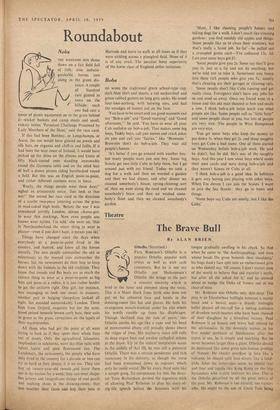Roundabout
Nobs
THE WEEKEND SUN shone down on a fair field full of folk; nine indistin- guishable horses tore along in the green dis-
spoor of picnic equipment on to the grass behind it—wicker baskets and camp stools and small, rickety tables. Perpetual Challenge Presented by Lady Members of the Hunt,' said the race card.
If this had been Bombay, or Longchamps, or Ascot, the sun would have glinted on jewels and silk hats, on organza and chiffon and faille. If it had been the west coast of Ireland, it would have picked up the shine on the elbows and knees of fifty black-coated men standing immovably round the Guinness table and on the oiled hair of half a dozen pirates riding barebacked round a field. But this was an English point-to-point, and rather different customs were in force.
'Really, the things people wear these days!' sighed an aristocratic voice. 'Just look at that suit!' She waved her race card in the direction of a scarlet two-piece tottering across the grass in mud-caked high heels. 'Before the war I was considered terribly London, almost chorus-girl. to wear thin stockings. Now even people one knows wear nylons. I'm told,' she went on, 'that in Northumberland the smart thing to wear is plaster—even if you don't hunt, it means you ski.'
Things have changed since the days when everybody at a point-to-point lived in the country, and hunted, and knew all -the horses socially. The new people outnumber the old as relentlessly as the massed cars outnumber the horses; bin the newcomers do their best to keep down with the Joneses in the old tradition. They know that tweeds and flat heels are as much the correct thing to wear at a point-to-point as big hats and jeans at a rodeo; it is just rather harder to get the uniform right One girl, for instance, was managing to look too smart in trousers; another pair in bulging sheepskins looked all right, but sounded unmistakably London. Three fops from Oxford, exquisite but for the acne, stood poised beneath brown curly hats, their suits as green as the grass, carnations on the lapels of their mackintoshes.
All those who had got the point at all were trying to look as if they spent their whole lives out of doors. Only the agricultural labourers, resplendent in sideburns, wore sky-blue suits with velvet lapels and pink fluorescent ties. The Londoners, the newcomers, the people who have only lived in the country for a decade or two can try as hard as they please; it is no' use. They can buy up twenty-year-old tweeds ,and leave them out in the bushes for a week; they can wear shape- less jerseys and insignificant strings of real pearls and walking shoes in the drawing-room; they can weather their faces and buy their hats at
Harrods and learn to walk at all times as if they were striding across a ploughed field. None of it is of any avail. The peculiar bony superiority of the horse class of England defies imitation.
Bobs
HE WORE the traditional green school-type cap, dark-blue shirt and shorts, a red neckerchief and green-tabbed garters on long grey socks. He stood four-foot-nothing, with batwing ears, and had the smudges of honest toil on his face.
'You have to be smart and use good manners and say "Bob-a-job" and "Good morning" and "Good afternoon," ' he said. 'You have to wear all your Cub uniform on bob-a-job. That makes some big boys, Teddy boys, call you names and crack jokes on you and call you "fairies," like "Brownies." Brownies don't do bob-a-job. They visit old people's homes.
'It's better if you go around with another boy, not many people want just one boy. Some big Scouts get two little Cubs to help them, but I go around just with my friend. Today we took a dog for a walk and then we weeded a garden and then we had dinner, and after dinner we cleaned somebody's house, spring-cleaning sort of, then we went along the road and we cleaned somebody's brass and then we washed some- body's floor and then we cleaned somebody's garden.
'Most, I like cleaning people's houses and taking dogs for a walk. I don't much like cleaning gardens: you find mouldy old apples and things. Some people like us to clean their windows, but that's really a Scout job. So far'—he pulled out a crumpled green card—'I've collected 13s. 3d. Last year some boys got £3.
'Some people give you 2s. Some say they'll give you Is. just as a tip and not do anything, but we're told not to take it. Sometimes you bump into these rich people who give you 5s.; mostly that's cleaning out their garages or cleaning cars.
'Some people don't like Cubs coming and get really cross. Foreigners don't have any jobs for us and send us away. Once my friend went to a house and this old man shouted at him and made a row. I think bob-a-job helps teach you what people are like. Some people call us "little boys" and some people shout at you, but lots of people are very nice. The people in West Hampstead are very nice.
'You get some boys who keep the money or put down Is. when they get 2s, and those naughty boys get Cubs a bad name. One of them started on Wednesday before bob-a-job week. He said he didn't, but he did. He's one of the naughty boys. And this year I saw some boys who'd made their own cards and were doing bob-a-job and they weren't Scouts or Cubs at all.
'I think bob-a-job is a good idea. In holidays it gets very boring just playing with other boys. When I'm eleven I can join the Scouts. I want to join the Sea Scouts: they go in boats and things.
'Some boys say Cubs are smelly, but I like the Cubs.'














































 Previous page
Previous page